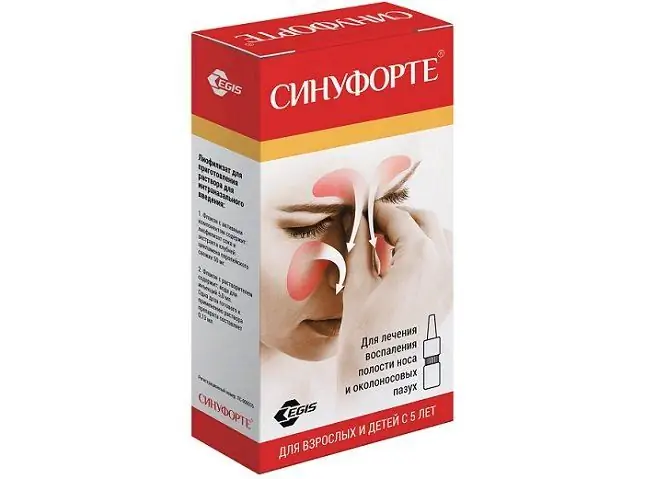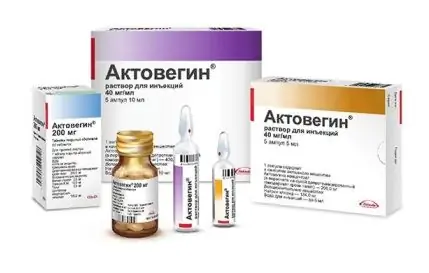- Author Rachel Wainwright wainwright@abchealthonline.com.
- Public 2023-12-15 07:39.
- Last modified 2025-11-02 20:14.
Azidothymidine
Azidothymidine: instructions for use and reviews
- 1. Release form and composition
- 2. Pharmacological properties
- 3. Indications for use
- 4. Contraindications
- 5. Method of application and dosage
- 6. Side effects
- 7. Overdose
- 8. Special instructions
- 9. Application during pregnancy and lactation
- 10. Use in childhood
- 11. In case of impaired renal function
- 12. For violations of liver function
- 13. Use in the elderly
- 14. Drug interactions
- 15. Analogs
- 16. Terms and conditions of storage
- 17. Terms of dispensing from pharmacies
- 18. Reviews
- 19. Price in pharmacies
Latin name: Azidothymidin
ATX code: J05AF01
Active ingredient: zidovudine (Zidovudine)
Manufacturer: CJSC "Biopharma" (Russia)
Description and photo update: 2019-10-07

Azidothymidine is an antiviral agent for the treatment of human immunodeficiency virus (HIV).
Release form and composition
Dosage form - capsules: hard gelatinous, size No. 1, white, yellow or two-color with a white body and a yellow lid; contents - granules and powder of white or white-yellowish color (10 pcs. in blister contour packs, 100 and 200 pcs. in dark glass jars or plastic bottles; in a cardboard box 10 blister contour packs or 1 can / bottle and instructions for the use of Azidothymidine).
Composition of 1 capsule:
- active substance: zidovudine - 100 mg;
- auxiliary components: potato starch, calcium stearate, lactose monohydrate, microcrystalline cellulose;
- capsule shell: gelatin, acetic acid, propyl hydroxybenzoate, methyl hydroxybenzoate, iron oxide red and / or titanium dioxide, and / or iron oxide yellow, and / or iron oxide black.
Pharmacological properties
Pharmacodynamics
Zidovudine belongs to the group of nucleoside reverse transcriptase inhibitors and is an analogue of thymidine. It has a pronounced inhibitory effect on retroviruses, including HIV. Once in cells (infected and intact), it is phosphorylated with the participation of cellular thymidylate kinase, nonspecific kinase and thymidine kinase with the formation of di-, tri- and monophosphate compounds, respectively.
Zidovudine triphosphate is both an inhibitor and a substrate of viral reverse transcriptase. This compound is structurally similar to thymidine triphosphate. It integrates into the DNA strand and contributes to the termination of the strand, which blocks the further formation of retroviral DNA. Zidovudine triphosphate increases the number of CD4 + cells (immune status) and increases the body's resistance to infection. Its ability to inhibit HIV reverse transcriptase is 100 times greater than its ability to inhibit human DNA polymerase α.
In vitro, zidovudine is active against Epstein-Barr virus and hepatitis B virus. However, the use of the drug as monotherapy in patients with AIDS (acquired immunodeficiency syndrome) and hepatitis B is accompanied by a slight suppression of hepatitis B virus replication.
Pharmacokinetics
The pharmacokinetic characteristics of Azidothymidine in adults and children over 3 months of age are largely similar.
After oral administration from the gastrointestinal tract, zidovudine is well absorbed. With the simultaneous intake of food, the rate and extent of absorption are reduced. Bioavailability is 60-70%.
The maximum concentration (C max) in the blood is observed after 30-90 minutes. Plasma proteins bind 34-38%. The volume of distribution is 1.6 l / kg.
Zidovudine penetrates into most tissues and body fluids, through the blood-brain barrier and the placenta. In the cerebrospinal fluid, the concentration of the drug in adults is 15-64% of the plasma content, in children - 24%. It is determined in the amniotic fluid and in the blood of the fetus; in children at birth, the plasma concentration of the drug is similar to that of the mother during childbirth. Zidovudine is excreted in breast milk. It accumulates in semen: the concentration exceeds that in the blood serum by 1.3-20.4 times. However, the drug does not affect the secretion of the virus with semen, therefore it cannot prevent sexual transmission of HIV.
The drug is metabolized in the liver by conjugation with glucuronic acid. The main inactive metabolite is 3'-azido-3'-deoxy-5'-O-beta-B-glucopyranuronosilthymidine. Its half-life (T ½) in patients with normal renal function is 1 hour, in patients with renal failure - 8 hours, anuria - 29-94 hours, cirrhosis - an average of 2.4 hours, but may vary depending on the degree violations of hepatic function. This metabolite has no antiviral activity. It is excreted by the kidneys.
Zidovudine is excreted by the kidneys: unchanged in adults - 14-18%, in children - 30%; in the form of glucuronides in adults - 60-74%, in children - 45%. T ½ from cells is 3.3 hours, from serum in adults - 0.8-1.2 hours, in patients with renal failure [creatinine clearance (CC) <30 ml / min] - 1.4-2.9 h, with cirrhosis of the liver - an average of 2.4 hours, however, it may vary depending on the degree of impairment of hepatic function. T ½ in newborns whose mothers received the drug during pregnancy is 13 hours.
Renal clearance in adults is 27.1 ml / min / kg, in children - 30.9 ml / min / kg. This figure exceeds the CC, which indicates the elimination of a significant part of zidovudine by tubular secretion.
Azidothymidine does not accumulate in the body, however, in chronic renal failure, the accumulation of zidovudine metabolites (conjugates with glucuronic acid) is possible, which increases the risk of developing toxic effects. Also, the accumulation of the drug is possible in patients with hepatic failure and liver cirrhosis due to a decrease in the intensity of binding with glucuronic acid.
Indications for use
- treatment of HIV infection in adults and children (as part of combination antiretroviral therapy);
- prevention of transplacental HIV infection of the fetus;
- prevention of occupational infection of persons who received cuts / injections while working with HIV-contaminated material.
Contraindications
Absolute:
- anemia (hemoglobin value <7.5 g / dl or 4.65 mmol / l);
- neutropenia / leukopenia (neutrophil count <0.75 x 10 9 / L or 750 / μL);
- lactase deficiency, lactose intolerance, glucose-galactose malabsorption;
- children under 3 years old;
- lactation (or breastfeeding is recommended to stop);
- hypersensitivity to any component of the drug.
Relative (Azidothymidine should be used with extreme caution):
- severe renal failure;
- liver failure;
- hepatitis;
- hepatomegaly;
- any known risk factors for liver disease;
- deficiency of cyanocobalamin or folic acid;
- oppression of bone marrow hematopoiesis;
- obesity;
- elderly age.
Azidothymidine, instructions for use: method and dosage
Azidothymidine capsules should be taken by mouth: swallow whole with sufficient water. Meal timing doesn't matter.
In the treatment of HIV infection, the following doses of the drug are recommended (used in combination with other antiretroviral drugs):
- adults and adolescents from 12 years old: 500-600 mg per day, divided into 2-3 doses;
- children 3-12 years old: 360-480 mg / m 2 in 3-4 doses.
In the case of a decrease in the hemoglobin level by 25% or the number of neutrophils by 50% of the initial value, the daily dose of Azidothymidine is reduced by 2 times or the drug is temporarily canceled. After the indicators are restored, the dose can be increased again to the usual daily dose. If the hemoglobin content drops to <75 g / L or the neutrophil count to <0.75 x 10 9 / L, treatment is stopped.
Dosage of Azidothymidine for prophylactic use:
- transplacental HIV transmission: 100 mg 5 times a day from the 14th week of pregnancy or 300 mg 2 times a day from the 36th week of pregnancy until the onset of labor, then 300 mg every 3 hours until the umbilical cord is cut;
- occupational HIV infection: 600 mg per day, divided into 2-3 doses, for a course of 4 weeks. It is recommended to start chemoprophylaxis of parenteral transmission of HIV no later than 72 hours after possible infection.
Patients with impaired liver function may need to reduce the dose of azidothymidine and / or increase the intervals between doses.
When creatinine clearance is> 10 ml / min, it is not necessary to adjust the therapy regimen. In severe functional disorders of the kidneys, the optimal daily dose is considered to be 300-400 mg. The need for further changes in the dose of the drug is determined individually, depending on changes in the peripheral blood picture and clinical effect.
Elderly patients with normal renal function do not require changes in the dosage regimen of Azidothymidine. However, one should take into account the possible age-related decrease in renal function and changes in peripheral blood parameters.
If you miss the next dose of Azidothymidine, you should not take a double dose, you should adhere to the usual treatment schedule.
Side effects
- blood system and hematopoietic organs: myelosuppression, thrombocytopenia, leukopenia, neutropenia, anemia (including aplastic), pancytopenia with bone marrow hypoplasia;
- central and peripheral nervous system: decreased mental performance, drowsiness / insomnia, dizziness, headache, anxiety, lethargy, weakness, paresthesia, convulsions, depression;
- digestive system: pigmentation of the oral mucosa, taste perversion, dyspepsia, flatulence, diarrhea, nausea, abdominal pain, vomiting, anorexia, pancreatitis, increased activity of liver enzymes and bilirubin concentration, hepatomegaly with steatosis;
- endocrine system and metabolism: gynecomastia, lactic acidosis in the absence of anorexia and hypoxemia;
- respiratory system: shortness of breath, cough;
- musculoskeletal system: myalgia, myopathy;
- urinary system: frequent urination, hypercreatininemia;
- cardiovascular system: cardiomyopathy;
- skin and subcutaneous tissue: increased sweating, pigmentation of nails and skin;
- allergic reactions: urticaria, itching, skin rashes;
- others: the development of a secondary infection, pain syndrome of various localization, fever, chills, malaise, redistribution of adipose tissue, increased serum amylase activity.
When assessing the tolerability of Azidothymidine, it is important to take into account that symptoms such as skin rashes, diarrhea, anorexia, weakness, dizziness, headache, anemia, myalgia and thrombocytopenia may not be toxic signs of zidovudine, but may be manifestations of HIV itself or secondary diseases, related to her.
Overdose
In case of an overdose, an increase in side effects is noted.
After taking an excessive dose of Azidothymidine, it is necessary to flush the stomach and take activated charcoal. Treatment is symptomatic. Peritoneal dialysis and hemodialysis are ineffective in the excretion of zidovudine, but accelerate the elimination of the glucurone metabolite.
special instructions
Azidothymidine should only be prescribed by a qualified healthcare professional. Treatment should be carried out under his close supervision.
Patients should be informed about the importance of regular intake of Azidothymidine, because otherwise there is a high risk of developing viral resistance and reducing the effectiveness of therapy.
In the process of therapy, it is necessary to systematically monitor the peripheral blood picture: in the first 3 months of taking the drug - every 2 weeks, then - once a month.
Hematologic changes usually appear 4-6 weeks after starting treatment. Neutropenia and anemia usually develop with the administration of high daily doses of zidovudine (1200-1500 mg) in patients with a reduced CD4 + cell count, advanced stage of HIV infection (in the case of a reduced bone marrow reserve before starting azidothymidine intake), and vitamin B 12 deficiency. Blood tests should be done more frequently if hemoglobin levels are> 25% or neutrophil counts> 50% lower than baseline.
During treatment, regular biochemical monitoring of hepatic function is shown: in the first 3 months of therapy - every 2 weeks, then - at least once a month. When laboratory or clinical signs of liver toxicity or the development of lactic acidosis appear, Azidothymidine is canceled.
During the period of therapy, it is necessary to monitor the immune status of patients in connection with the risk of developing opportunistic infections and other complications of HIV infection.
With the simultaneous use of any drug with a myelo- or nephrotoxic effect, it is necessary to carefully monitor hematological parameters and renal function.
The incidence of side effects is mainly associated with the dose of Azidothymidine and the duration of its use. Adverse reactions are more likely to appear in the later stages of the disease. In the first days of taking the drug, loss of appetite, diarrhea, weakness and dizziness are possible, but later (within several weeks of therapy) these symptoms significantly decrease or disappear.
Lactic acidosis and severe hepatomegaly with steatosis are fatal. In case of the appearance of clinical symptoms of these complications or the detection of corresponding deviations in laboratory studies, it is necessary to stop using Azidothymidine.
Patients should be warned about the dangers of using over-the-counter drugs with zidovudine without consulting their doctor.
Every patient should be informed that antiretroviral therapy does not prevent HIV transmission through infected blood and sexual contact (appropriate safety measures must be taken).
Influence on the ability to drive vehicles and complex mechanisms
Azidothymidine can cause side effects that can affect the speed of reactions and the ability to concentrate (for example, drowsiness and dizziness). Patients are advised to be careful when performing potentially hazardous activities and driving a car.
Application during pregnancy and lactation
The drug crosses the placenta. Until the 14th week of pregnancy, the use of Azidothymidine is not recommended, however, it is possible if the expected benefit is definitely higher than the potential risks.
Zidovudine is excreted in breast milk. If a course of treatment is required during lactation, the doctor should recommend that the woman transfer the baby to artificial feeding.
Pediatric use
Azidothymidine is not used to treat children under 3 years of age.
With impaired renal function
With creatinine clearance> 10 ml / min, there is no need to adjust the therapeutic regimen. For patients with severe functional impairment of the kidneys, the optimal daily dose is 300-400 mg. The need for further changes in the dose of Azidothymidine is determined individually, depending on changes in the peripheral blood picture and clinical effect.
For violations of liver function
The drug is used with caution in liver failure, hepatitis and hepatomegaly. It may be necessary to reduce the dose of Azidothymidine and / or increase the intervals between doses.
Use in the elderly
In elderly patients, Azidothymidine should be used with caution. It is necessary to take into account the possible age-related decrease in renal function, as well as changes in peripheral blood parameters.
Drug interactions
- other drugs used against HIV (especially lamivudine): there is a synergistic effect on HIV replication in cell culture;
- ribavirin: the phosphorylation of zidovudine to triphosphate is suppressed (not recommended combination);
- fluconazole: its concentration increases;
- probenicid and other inhibitors of tubular secretion: the half-life of zidovudine increases;
- radiation therapy: the myelosuppressive effect of zidovudine is enhanced;
- phenytoin: a change in its concentration in the blood is possible;
- inhibitors of microsomal oxidation in the liver (including codeine, morphine, valproic acid, acetylsalicylic acid, inosine pranobex, lorazepam, oxazepam, indomethacin, cimetidine, ketoprofen, clofibrate, naproxen): the plasma concentration of zidovudine increases;
- rifampicin: the plasma concentration of zidovudine decreases, which may lead to a decrease in its effectiveness;
- drugs with nephrotoxic and myelosuppressive effects (amphotericin B, vinblastine, vincristine, ganciclovir, doxorubicin, dapsone, interferon alfa, co-trimoxazole, pyrimethamine, pentamidine, flucytosine): the risk of developing the toxic effect of zidovudine increases;
- stavudine: there is an antagonistic effect when the ratio of molar concentrations of stavudine and zidovudine is 20: 1 (simultaneous administration of drugs is not recommended);
- paracetamol: the metabolism of zidovudine is inhibited (since both drugs are glucuronized), as a result of which the incidence of neutropenia increases;
- clarithromycin tablets: absorption of zidovudine decreases (intervals of at least 2 hours should be observed).
Analogs
Analogs of Azidothymidine are: Abacavir, Atazanavir, Videx, Heptavir-150, Didanosine, Zerit, Zidovudine, Interfast, Isentress, Kaletra, Kivexa, Combivir, Lamivudin, Nevirapin, Olitid, Presista, Regast, Stavudino, Timazid, Fazid Edurant, Emtricitabine, Epivir, Efkur-600, Efavirenz, etc.
Terms and conditions of storage
Store in a dry and dark place, out of the reach of children, at a temperature not exceeding 25 ° C.
Shelf life is 2 years.
Terms of dispensing from pharmacies
Dispensed by prescription.
Reviews about Azidothymidine
There are no reviews directly about Azidothymidine on specialized medical sites, but there are many reports about its active substance - zidovudine, which is part of various antiretroviral drugs. It is difficult to judge its effectiveness, since in the treatment of HIV infection the drug is used as part of a combination therapy. In addition, research data indicate the rapid development of zidovudine resistance, which necessitates frequent changes in treatment regimens.
Potent drug combinations are currently used to suppress viral replication, such as zidovudine + lamivudine + ritonavir. And even such a scheme, according to doctors, does not always give the necessary virological response and at one time or another of treatment causes side reactions, since a distinctive feature of all antiretroviral drugs is high toxicity.
Most patients indicate that they were prescribed zidovudine in the first year of treatment, but was later canceled due to the development of adverse reactions, or the development of resistance, or treatment failure.
Zidovudine is the first drug used in HIV-infected pregnant women. It is used to reduce the risk of mother-to-child transmission of the virus. Until now, it remains a treatment option for low viral load.
Price for Azidothymidine in pharmacies
The average price for Azidothymidine is 998 rubles. per package containing 100 capsules.

Anna Kozlova Medical journalist About the author
Education: Rostov State Medical University, specialty "General Medicine".
Information about the drug is generalized, provided for informational purposes only and does not replace the official instructions. Self-medication is hazardous to health!






